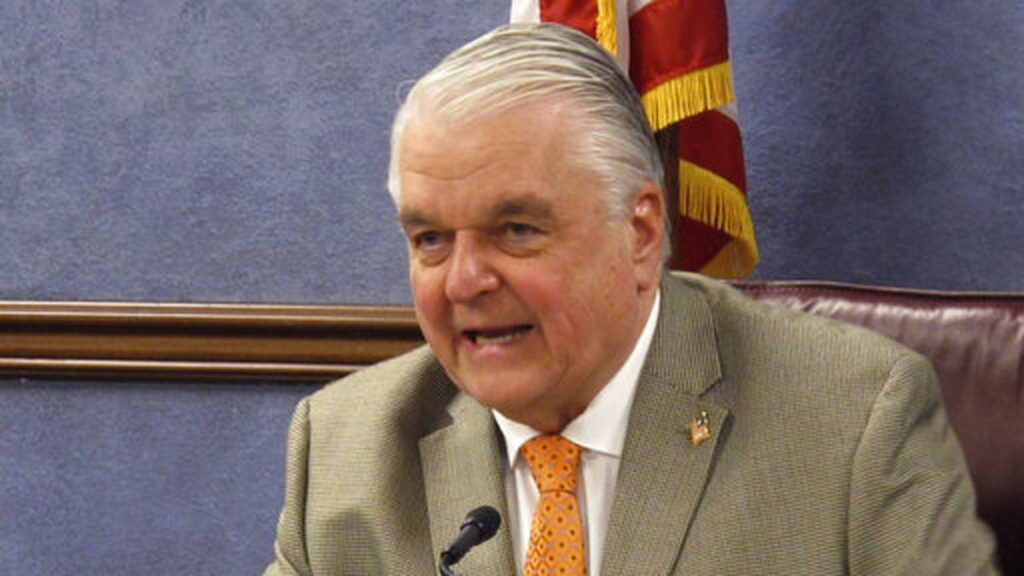Will Team Biden Weaponize Workers’ Pensions?
Big Labor abuse of worker pension and benefit funds as a means of advancing union bosses’ self-aggrandizing policy objectives is a familiar phenomenon.

Union Dons Bitterly Denounce Governor Whom They Lauded in 2019
Big Labor Democrat Gov. Steve Sisolak can’t say he wasn’t warned.
A little over a year ago, legislation (S.B.135) handing government union bosses monopoly-bargaining power over roughly 20,000 state employees was sitting on Mr. Sisolak’s desk.
A few months earlier, he had declared his support for granting Big Labor “exclusive” bargaining control over state employees like prison guards and highway patrolmen. But Mr. Sisolak had not committed himself to signing S.B.135 itself.
In a letter written on behalf of National Right to Work Committee members and other freedom-loving citizens in Nevada, Committee President Mark Mix admonished the governor.
Do not force additional tens of thousands of workers to allow officers of a union they may not personally support to speak for them on important matters concerning their pay, benefits, and work rules, urged Mr. Mix.
Governor Clearly Already Knew Bill Was Problematic Before He Signed It
If S.B.135 became law, warned Mr. Mix, it would trample civil servants’ personal freedom and sabotage efforts to make government operate more efficiently. Citizens would end up paying “higher taxes,” while getting “less from their tax dollars in return.”
Despite having gratefully accepted massive Big Labor campaign support during his 2018 campaign in exchange for agreeing to reward union bosses in his state with new special privileges if elected, Mr. Sisolak obviously recognized S.B.135 was problematic.
That’s why, late last May, his staffers and apprehensive union-label senators decided to replace the original S.B.135 with a “compromise” measure, narrower in scope, but still antithetical to state employees’ individual rights and taxpayer interests.
Unlike the original, S.B.135 as passed says that the Nevada Legislature can potentially veto exorbitant monopoly-bargaining deals. This is the scheme Mr. Sisolak rubber-stamped last June.
That was just 15 months ago. But today it’s already obvious that Mr. Sisolak’s attempt to have it both ways when it comes to protecting taxpayers and enhancing Big Labor’s coercive power is a failure.
American Federation of State, County and Municipal Employees (AFSCME) Local 4041 President Harry Schiffman, who last year applauded Mr. Sisolak’s “historic” signing of S.B.135, now berates the governor’s actions as a “disgrace to our state and a disservice to all Nevadans.”
What has Mr. Sisolak done to turn his erstwhile friends against him? Facing a $1.3 billion deficit for the fiscal year starting July 1, primarily as a consequence of the coronavirus pandemic and the economic lockdown he imposed this spring to stem its spread, Mr. Sisolak wants to reduce FY 2021 spending by furloughing 21,000 employees for one day every month.
He also advocates freezes on merit raises and filling job vacancies.
He believes he has authority under S.B.135 to circumvent monopoly-bargaining deals when the state faces a crisis, as it clearly does today.
But government union bosses insist that, even in the wake of the steepest economic downturn since the Great Depression, the governor can’t make even the modest cuts he proposes without their permission.
They seem determined to shift virtually all of the recession’s burden to taxpaying employees and businesses. Thanks largely to S.B.135, they may well get their way.
Virginia State Politicians Have One Last Chance to Correct Their Mistake
The ongoing fiscal fiasco in Carson City, Nev., should prompt state politicians in Richmond, Va., to save themselves before it’s too late, noted Mr. Mix.
“This spring,” he explained, “Virginia Gov. Ralph Northam and his fellow Democrat politicians in the state General Assembly colluded to overturn the statutory ban on government-sector monopoly bargaining that had benefited the Old Dominion since 1993.
“But the new law green-lighting Big Labor ‘exclusive representation’ over public servants does not take effect until next May 1.
“As Virginia continues to grapple with coronavirus-related budget woes, handing vast new powers to AFSCME and other government union bosses is the last thing the state should be doing.
“That’s why, when the General Assembly reconvenes in early 2021, Right to Work members will be urging lawmakers to correct their mistake and repeal the monopoly-bargaining law before it takes effect.”

Big Labor abuse of worker pension and benefit funds as a means of advancing union bosses’ self-aggrandizing policy objectives is a familiar phenomenon.

Leaked CTU Proposals Won’t Do Anything to Improve Schools’ Poor Performance

What impact does handing a union monopoly power to deal with your employer on matters concerning your pay, benefits, and work rules have on your pay?